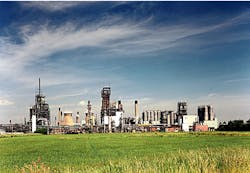BP slates more expansion at Grangemouth
Another expansion project at BP Chemicals Ltd.'s Grangemouth, Scotland, petrochemicals complex has been disclosed, hard on the heels of expansion projects that just got under way at the complex this year. Photo courtesy of BP.BP Chemicals Ltd.'s capacity expansion plans involving U.K. plants mark the company's latest efforts to consolidate its position in the European petrochemicals market.
BP earlier this month disclosed expansion projects worth a combined £500 million ($850 million) at its Grangemouth petrochemicals complex near Edinburgh and at a complex in Hull in northeast England (OGJ, Nov. 16, 1998, Newsletter).
The move is the latest step in a plan to increase capacity in a variety of products, and follows the start of work on new polyethylene and polypropylene plants at Grangemouth (OGJ, May 4, 1998, p. 56).
Grangemouth expansion
New projects at Grangemouth are: a 270,000 metric ton/year capacity expansion of the KG ethylene cracker, one of two in the complex; construction of a 110,000 ton/year ethanol plant; and building a combined heat and power (CHP) plant to generate up to 130 MW of electric power and 230 tons/hr of steam, mainly for onsite consumption.The cracker expansion will take Grangemouth's ethylene capacity to more than 1 million tons/year. It will be completed along with the CHP plant in 2000, while the ethanol unit is due to be completed in 2001.
In addition, an existing ethylene pipeline from Grangemouth to Tees- side will be extended by 151 km to reach Hull, farther down the eastern coast of England from Teesside.
Hull projects
At Hull, BP plans to build a 250,000 ton/year vinyl acetate monomer (VAM) plant and a 220,000 ton/year capacity ethyl acetate plant, due on stream in 2000 and 2001, respectively. The new plants will enable BP to replace: a VAM manufacturing agreement with Italy's Enichem SpA, which expires in 2000, plus a 115,000 ton/year VAM plant at Baglan Bay, South Wales; and a 150,000 ton/year ethanol plant at Baglan Bay. Closure of BP's two Baglan Bay plants will lead to the loss of 150 jobs after 2000. The new plants are based on more competitive processes than those at the aging Baglan Bay site (see related story, this page).Bryan Sanderson, chief executive of BP Chemicals, said, "This package of advantaged investments will yield enormous value for BP. It will increase mid-cycle earnings by £85 million/year ($145 million) mainly from reduced production and logistics costs."
Copyright 1998 Oil & Gas Journal. All Rights Reserved.
